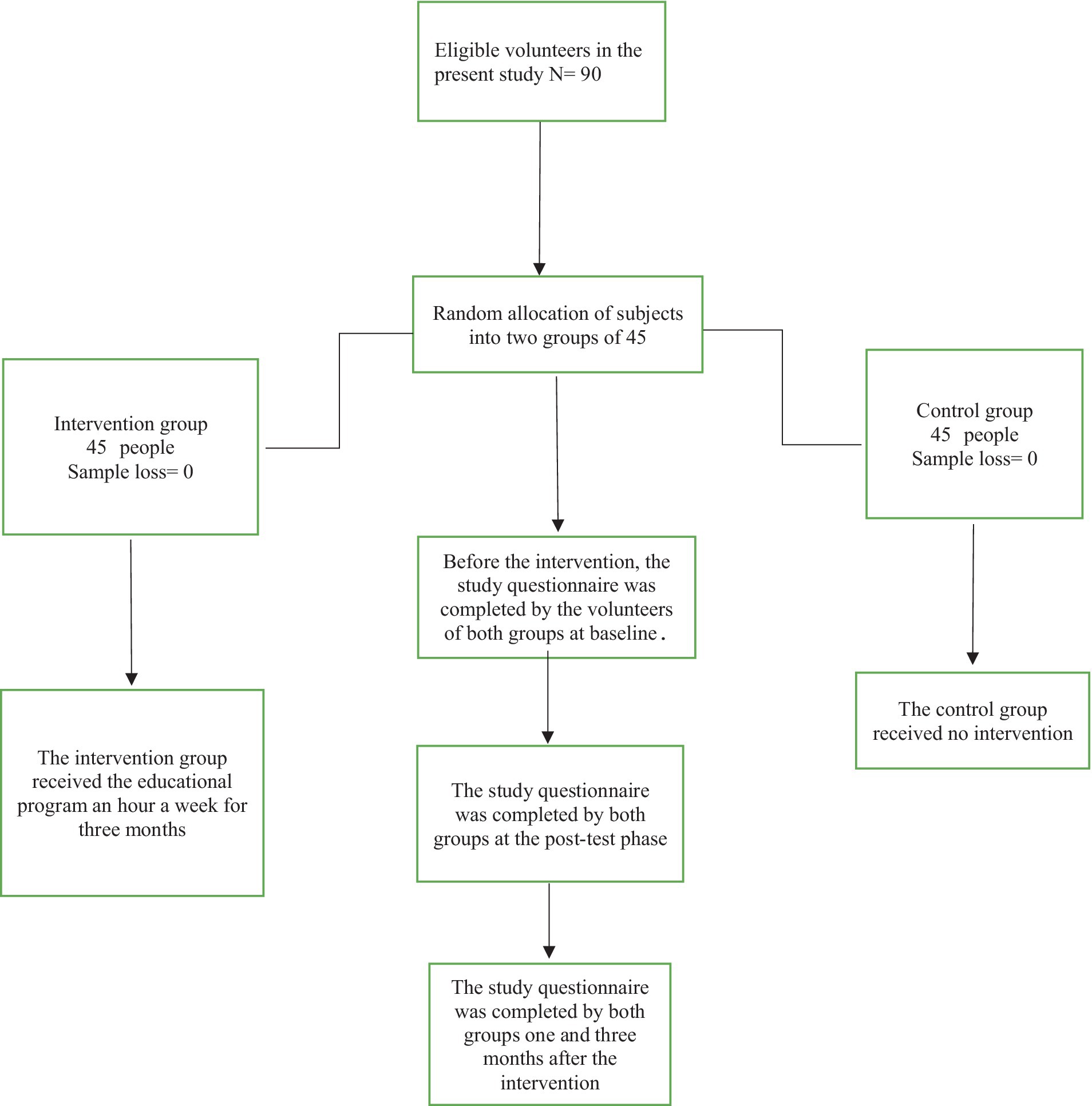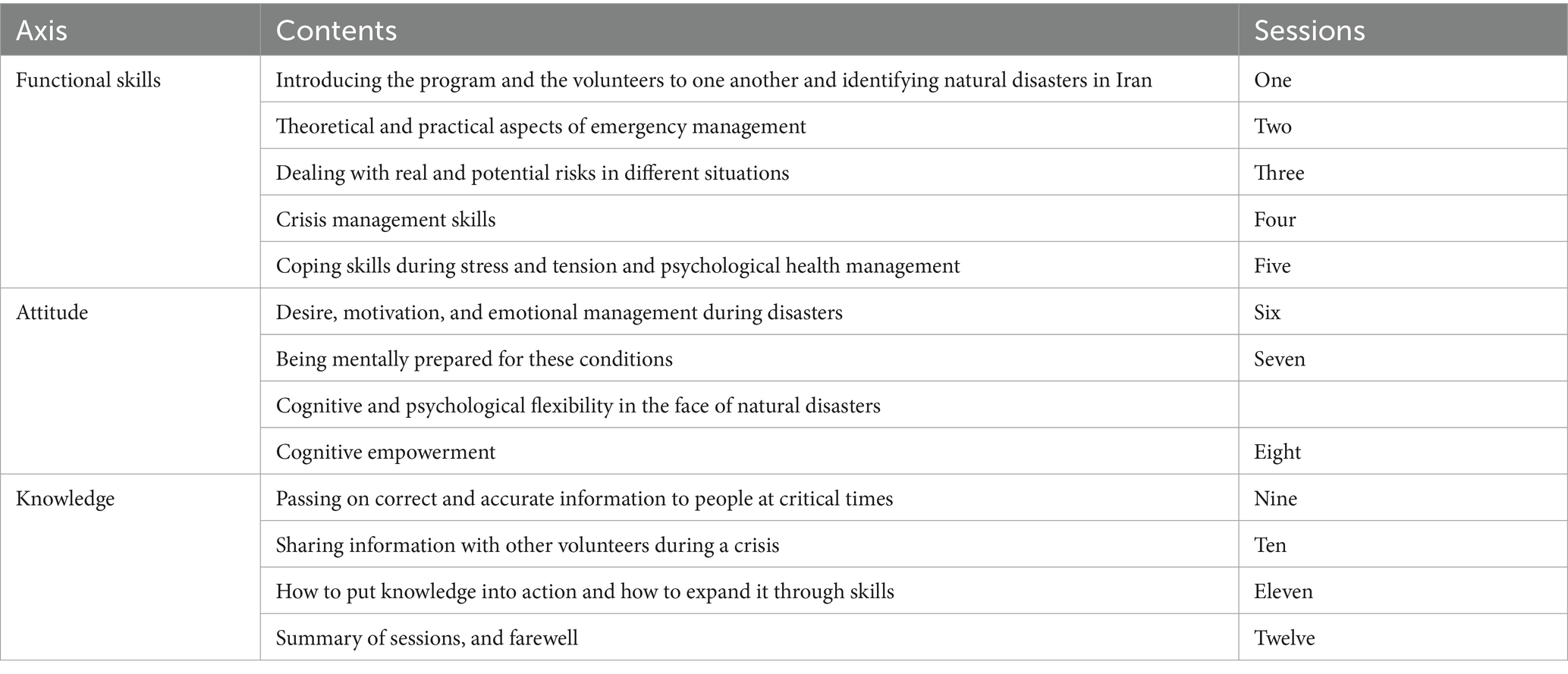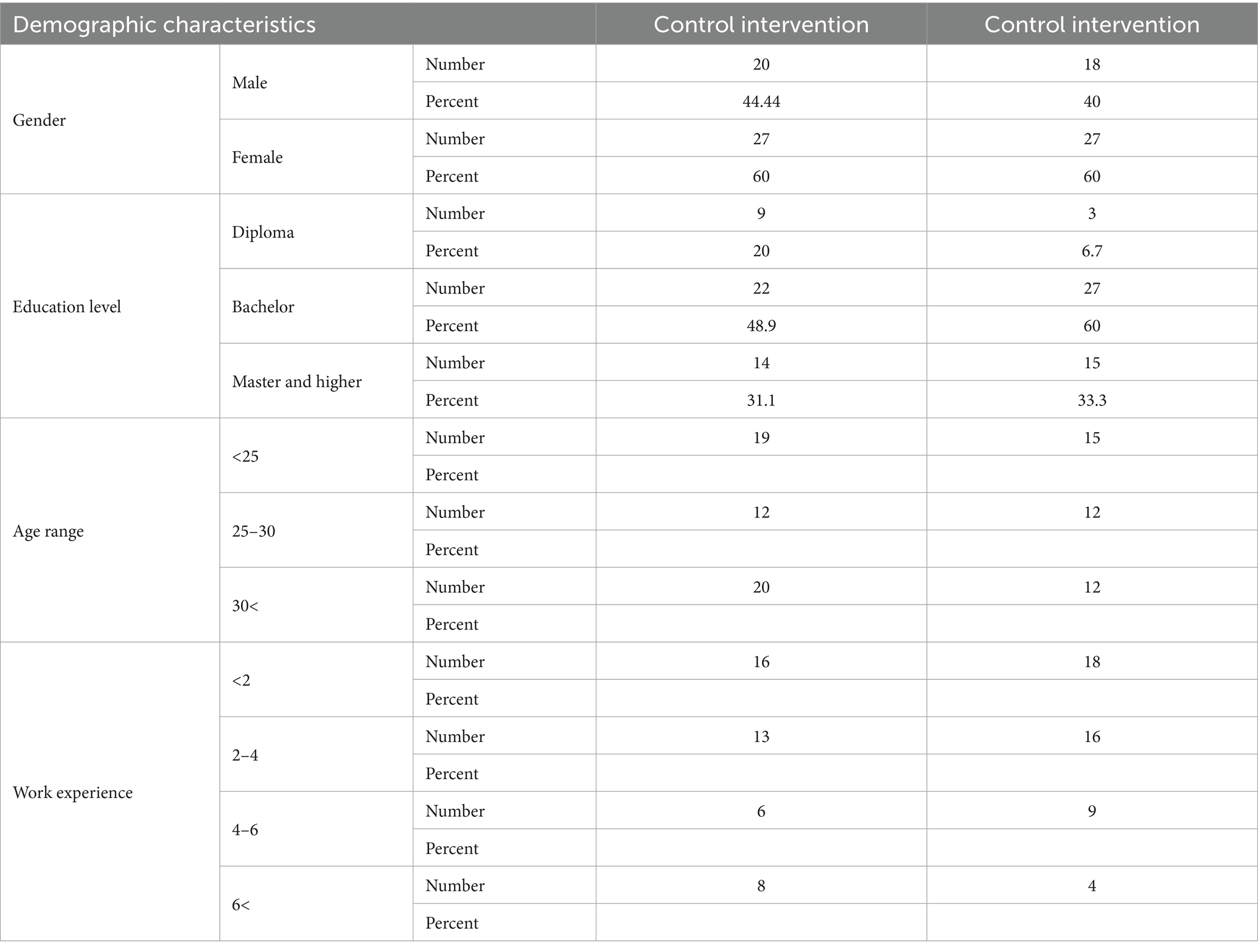- 1Faculty of Medical Sciences, Tarbiat Modares University and Educational Board of Department of Internal Surgery, Faculty of Nursing and Midwifery, Tehran University of Medical Sciences, Tehran, Iran
- 2Department of Health Education and Health Promotion, Faculty of Medical Sciences, Tarbiat Modares University, Tehran, Iran
- 3Department of Community Medicine, School of Medicine, Ahvaz Jundishapur University of Medical Sciences, Ahvaz, Iran
Introduction: Disaster relief volunteers must have certain psychological and cognitive characteristics. Therefore, the present study aimed to investigate the effectiveness of the training program on improving knowledge, functional skills, and attitude among disaster volunteers.
Methods: A quasi-experimental study was conducted in 2023 in Iran, including an intervention and control group and follow-ups. Ninety health volunteers were randomly selected and divided into two groups of 45. The experimental group received the training program for an hour a week for three months. The control group received no intervention. The participants of both groups completed the disaster preparedness questionnaire at the pre-test, post-test, and one and three months after the intervention. Data was analyzed using SPSS “version 26” software in the methods section.
Results: The intervention effect were significant in increasing the volunteers’ functional skills (F = 3.75), knowledge (F = 166.50), and attitude (F = 1.74), all in (p = 0.001). According to the results, this effect was stable over time for functional skills (F = 1.83) and knowledge (F = 18.04) all in (p < 0.05).
Conclusion: Training programs can help improve skills, attitudes and knowledge in natural disaster volunteers. Researchers interested in the field of natural disaster relief, particularly health researchers, could consider further examining the aforementioned topics in their studies.
1 Introduction
Natural disasters include earthquakes, droughts, floods, hurricanes, blizzards, and so on. Disaster preparedness is the ability of public health and healthcare systems, communities, and individuals to anticipate, protect, rapidly respond, and recover when coping with disasters (1). In other words, disaster preparedness is an integrated process that involves a variety of activities and resources as opposed to separate tasks. This necessitates readiness across various domains, ranging from education and logistics to healthcare (2). The World Health Organization’s (WHO) health policy guidelines emphasize the importance of training and professional development of individuals involved in disaster management (3). Indeed, in critical situations such as natural disasters, material, physical, and mental resources are weakened, and the needs of vulnerable people are not met. Vulnerable people do not have access to standard resources employed to prepare them for coping with, responding to, and recovering from disasters (4). In such circumstances, volunteers are valuable people who play key roles by improving people’s experiences, creating strong connections between the community and services, facilitating care integration, promoting public health, and reducing health inequities (5).
Volunteers deal with individuals’ personal, family, social, health, and psychological problems in disasters and similar situations (6). Since volunteers are considered role models in the society, they can have long-term effects on people’s perceptions, beliefs, and attitudes (7). Having functional skills can help volunteers improve their performance during disasters (8). These skills are related to personal capacity, level of knowledge, and inner satisfaction (9). With the advancement of technology and science, volunteers can now easily access new knowledge in various health fields (10). However, knowledge alone is not enough and volunteers need skills and attitude to manage crises (11). Broadly speaking, volunteers’ knowledge, skills, and attitudes can comprise ethics, emergency maneuvers, personal protective equipment, public health measures, awareness of specific disasters, incident command system (ICS), disaster triage, and emergency planning (12).
Continuous volunteer training is essential for their professional growth and can help them acquire new skills, knowledge, and competencies, which are necessary for the tasks they undertake (13). It can increase their confidence, performance, and effectiveness in providing health services (14). Studies have shown that trained volunteers are more likely to have a positive impact on victims health status (15). Health volunteer training should be designed to meet the specific needs of their roles and responsibilities, providing the necessary knowledge and skills to perform their duties effectively (16, 17). Education and training should be ongoing to ensure that volunteers stay up-to-date with the latest trends, practices, and policies in health care (18). Several studies have pointed out the role of education in increasing people’s safety during disasters and emergencies (19). Continuous education should be provided to nurses to improve their preparedness and motivation at times of crisis (20). Implementing training programs as part of the disaster management cycle improves volunteer preparedness (21). In other words, it will raise awareness among health staff regarding available programs to deal with disasters, increase their participation in planning and solving problems, and improve their skills to perform their responsibilities during disasters (22). A study conducted in the United States indicates that training volunteers enhances their management in different dimensions (23). Another study showed that evidence-based training enhances emergency preparedness skills in volunteers (24). A systematic review indicated that training programs are effective in increasing volunteers’ knowledge (12).
To our knowledge, there is no study that has examined the impact of an educational program on improving functional skills, knowledge, and attitude among natural disaster volunteers especially in Iran. In this country, we face many natural disasters such as floods, earthquakes, and so on. Therefore, we need training programs to increase the knowledge, attitude and skills of the volunteers. In Iran, natural disaster volunteers enroll in the Red Crescent Organization to be able to participate in volunteering activities, and are often ready to receive training in this field. For this reason, the innovative aspect of this study was in the design of the training program and its validation. Therefore, the present study aimed to investigate the effectiveness of the training program in improving their knowledge, skills, and attitude in natural disasters in Iran.
2 Methods
As the hypothesis of this study seeks to investigate the effectiveness of the training program in strengthening knowledge, functional skills and attitude in disaster volunteers, therefore, a quasi-experimental study was conducted in 2023 in Iran, including an intervention and a control group and follow-ups. Using Cohen’s formula (1988) and considering the first and second type errors, and the expected average difference in the study groups, the minimum sample size was estimated at 15. Nevertheless, 90 health volunteers were randomly selected and assigned to two groups of 45. The main researcher communicated with the volunteers after attending the Red Crescent Office and becoming a member of their social networks. Once she explained the research objectives she asked the volunteers to contact her. The inclusion criteria were, willingness to participate, having at least one year of volunteering experience, being physically fit for voluntary service delivery, and being aged 25–40 years old. Exclusion criteria included, missing more than two sessions of the educational program and being physically unfit for health and medical service delivery. The intervention group received the ‘Knowledge, Functional Skills, and Attitudes Training Program’ designed by the main researcher for an hour a week for three months. The control group received no intervention. The participants of both groups completed the disaster preparedness questionnaire by Ghanbari et al. (25) at the pre-test, post-test, and one and three months after the intervention at the follow-ups.
2.1 Ethical considerations
The purpose of this study was explained to the study group at the beginning of the study and volunteers were ensured that their names and demographic characteristics would remain confidential. Furthermore, the intervention group was told that they could leave the study whenever they wanted. Written informed consent was taken from the participants after the aforementioned were explained to the participants (see Figure 1).
2.2 Tools
A demographic questionnaire was designed, including age, gender, marital and educational status, and professional experience.
The other tool used was Ghanbari et al.’s Natural Disaster Preparedness Questionnaire (2010). This questionnaire contains 72 items that are scored as Yes (1) and No (0). Therefore, the range of scores is between 0 and 72. This questionnaire has three subscales; attitude, functional skills, and knowledge. The content validity of this questionnaire has been approved by experts. Cronbach’s alpha coefficient was calculated for the subscale of knowledge at 0.61, attitude at 0.88, functional skills at 0.89, and 0.87 for the whole questionnaire (25). Here, Cronbach’s alpha was calculated at 0.89 for the entire questionnaire.
The Knowledge, Functional Skills, and Attitudes Educational Program (Training Program) The Knowledge, Functional Skills, and Attitudes Training Program was developed by the main researcher of this study, and content validity was approved by the health experts. This program was held an hour a week for three months for the intervention group (12 sessions) (Table 1).
For inferential analysis, after checking the underlying assumptions, analysis of variance of repeated measurements was used. After collecting the data, it was analyzed descriptively and inferentially using SPSS statistics version 26.
This study was registered in the Iranian Registry of Clinical Trials under registration number IRCT20180712040443N1.
3 Results
The number of males and females in the intervention group were 20 and 27, respectively, and in the control group they were 18 and 27, respectively. The majority of the participants in both the intervention and control groups held bachelor degrees. The volunteers’ age range and duration of professional experience are illustrated in Table 2.
The results of the Shapiro–Wilk test showed the normal distribution of the research variables. The confirmation of the null hypothesis in the study’s variables affirms the assumption of equal variances. This confirmation is observed in the variables of knowledge (p = 0.449, F = 0.584), attitude (p = 0.594, F = 0.289), and functional skills (p = 0.094, F = 2.904). Therefore, the assumptions were confirmed to implement a mixed-model analysis of variance (Table 3).
Table 4 shows the adjusted means of knowledge, attitude, and functional skills of the disaster volunteers before and after the intervention and follow-ups in the studied groups. There was a significant increase in the mean knowledge, functional skills, and attitude of the intervention group compared to the control group after the intervention.
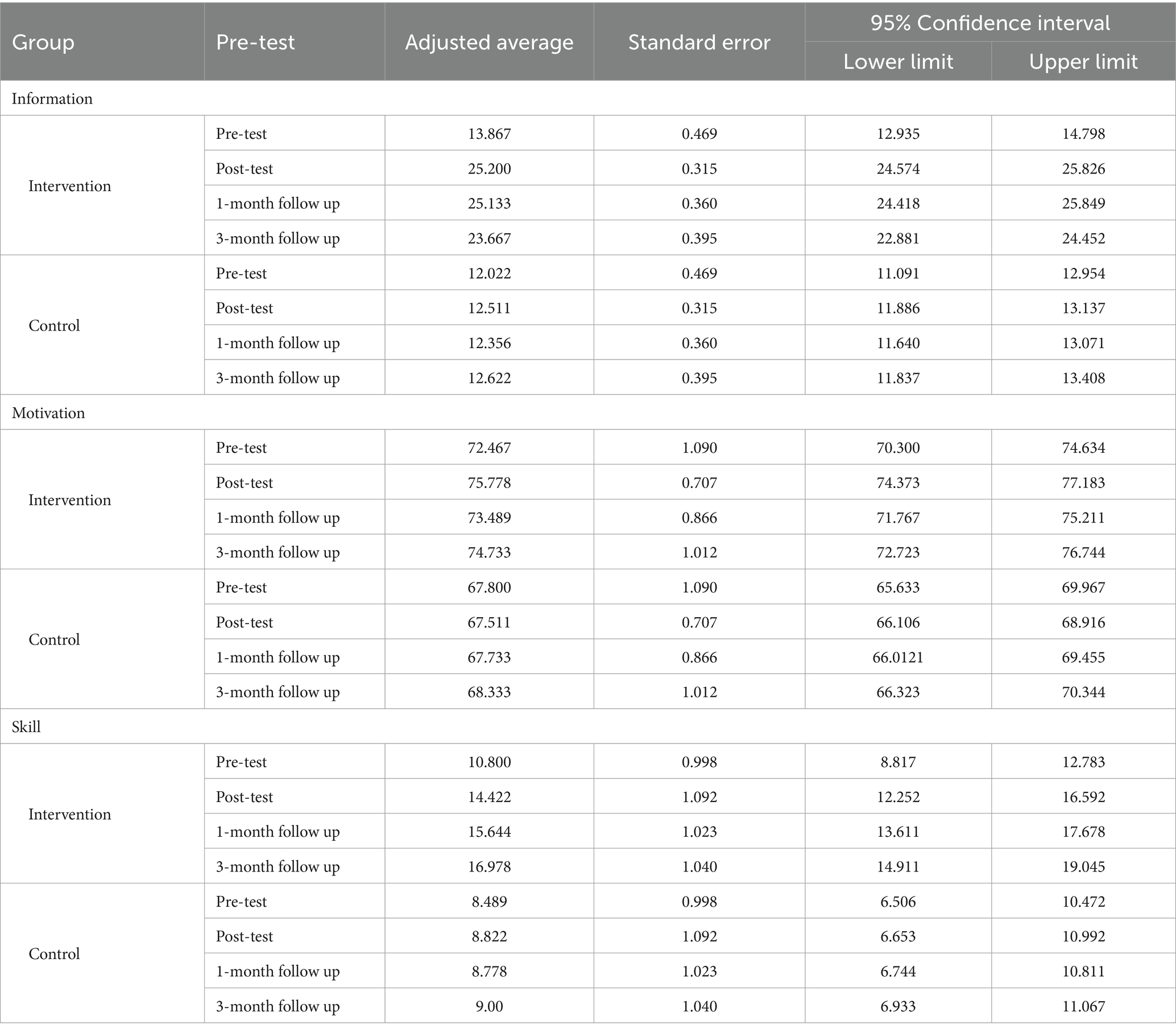
Table 4. The averages of the information, motivation, and skill level of health volunteers before and after the educational intervention.
Based on the two-factor variance test, the time factor (p = 0.001, F = 196.250), and the intervention’s effect on the time factor (p = 0.001, F = 166.506) significantly increased the volunteers’ mean knowledge (Table 5), and so did the group factor (F = 512.429, p = 0.001). However, the effect size of the group factor was equal to 0.85, thus, the 85 percent variance increase may be attributed to this intervention. In simpler terms, 85 percent of volunteers in the intervention group experienced a rise in their mean knowledge level when compared to the control group.
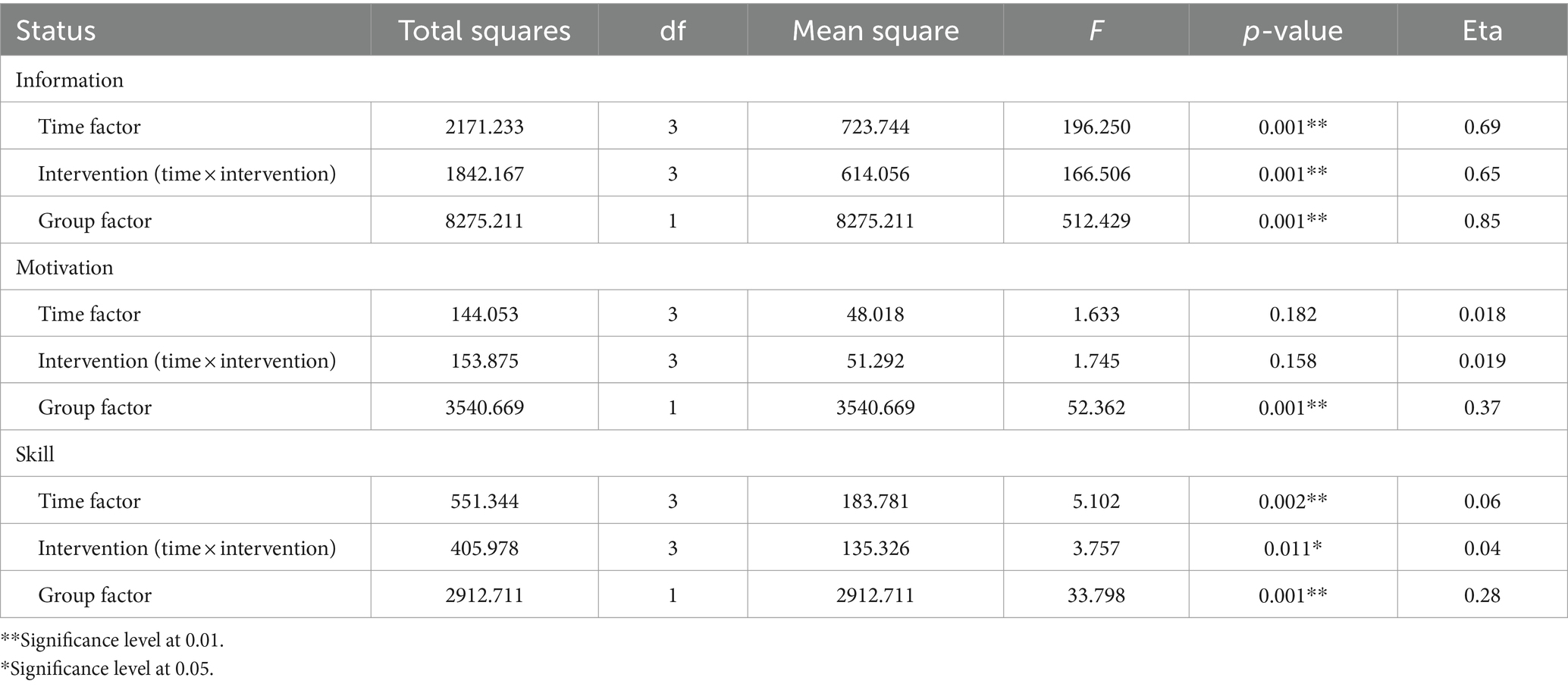
Table 5. The results of two-factor variance analysis of information level in the intervention and control groups.
The time factor (p = 0.182, F = 1.633), and the intervention effect on the time factor (p = 0.158, F = 1.745) were not significant in increasing the attitude level of the volunteers. Moreover, the group factor (p = 0.001, F = 52.362) significantly increased the attitude level of the volunteers. In other words, although the time factor and intervention effect on the time factor increased the mean attitude level of the intervention group, however, this increase was not statistically significant. The effect size of the group factor was equal to 0.37 (Eta = 0.37); so, overall, 37 percent of the volunteers in the intervention group experienced an increase in their mean attitude scores compared to the control group.
The time effect (F = 5.102, p = 0.002) and the intervention effect (F = 3.757, p = 0.001) were significant in increasing the volunteers’ functional skills. Also, the group factor (F = 33.798, p = 0.001) significantly raised the mean level of functional skills. In other words, the intervention improved the volunteers’ functional skills. Furthermore, the effect size of the group factor stood at 28 percent, meaning the educational intervention accounted for 28 percent of the variance in improved functional skills among the health volunteers in the intervention group (Table 6).
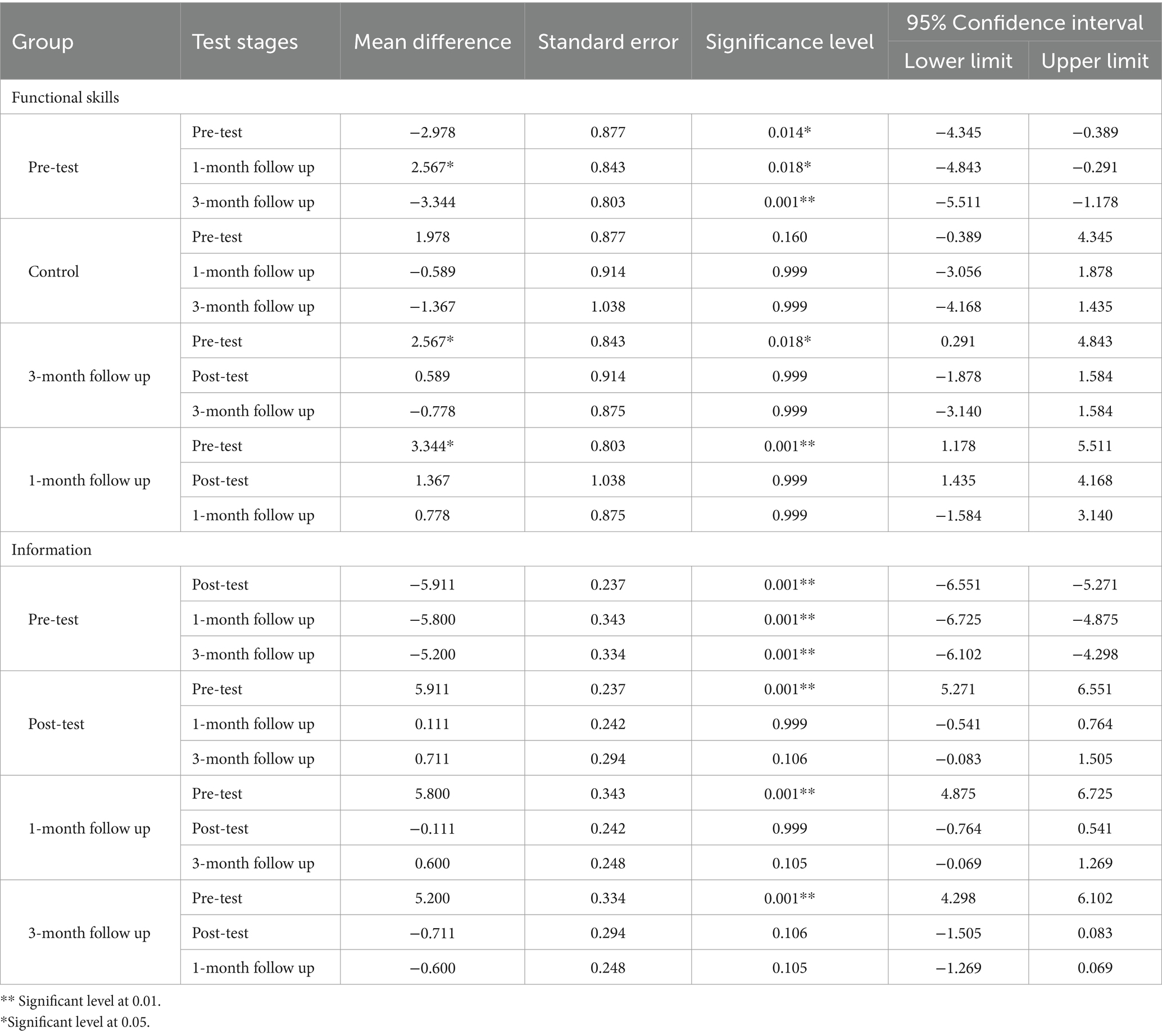
Table 6. Bonferroni test results to compare the functional skills and information level of health volunteers in the pre-test, post-test, and follow-ups.
There were significant differences between the functional skills (F = 1.83), and knowledge (F = 18.04) scores at pre-test and post-test stages at one-month and three-month follow-ups. However, there was no significant difference between the one-month and three-month follow-ups in attitudes (F = 0.03) (p > 0.05). So, the intervention effect was observed in the time series.
4 Discussion
The purpose of the present study was to investigate the effectiveness of the training program in improving knowledge, skills, and attitudes in natural disaster volunteers. Based on our results, the training program enhanced their attitude, functional skills, and knowledge at the post-test stages. However, only improvements in functional skills and knowledge sustained at the one-month, and three-month follow-ups.
Our study’s results are consistent with those of Iizuka (23), Levina Chandra and Chan (24), Sena et al. (21), and Ahmadi Marzaleh et al. (12). In all these studies the training program was effective in improving the volunteers’ skills, knowledge, and attitude. In explaining this finding, it seems that the lack of trained volunteers in disasters is a big challenge for healthcare systems worldwide, especially in low-income countries. As studies indicate, preparedness comes with higher knowledge and skills, which in turn help to cope with disasters (26). Trained volunteers can prove beneficial by transferring knowledge and experiences to local communities and improving public awareness concerning the management of various crises or disasters (27). Raising awareness and knowledge among volunteers improves their attitudes at times of crisis too (28).
Here, the training program improved the volunteers’ functional skills, creating a friendly atmosphere and improving their communication skills at the post-tests and later follow-ups. However, it is crucial to focus on the appeal of educational subjects and packages to encourage volunteers to sustain their voluntary contributions. Moreover, functional skills need to be regularly practiced and kept up-to-date through continuous educational programs. Knowledge gained during regular educational sessions increases volunteers’ competence (e.g., communication skills) and self-confidence and may encourage them to continue volunteering due to their enhanced attitude (29). Therefore, there is a mutual interaction between knowledge and attitude in individuals opting for voluntary participation and promotion. Over time, knowledge is stable, but attitude can easily change. From a cognitive viewpoint, attitude is mainly based on a person’s behavior rather than cognition or feeling. Perhaps, this is because attitude has emotional characteristics and is influenced by changes in one’s mentality (30). Thus, attitude is influenced by one’s emotions (31). Volunteers assisting in disaster events may adjust their attitudes based on various factors, including their personal circumstances and demographic characteristics like age and change in socio-economic status. Ongoing support provided to volunteers plays a key role in helping them overcome negative expectations and emotions, as attitudes significantly influence our expectations, emotions, affects, and motivation (32, 33). Among the limitations of this study were the lack of cooperation on behalf of some of the volunteers under study, and coordinating the sessions with them.
5 Conclusion
Based on our results, the training program was able to improve functional skills, knowledge, and attitude among disaster volunteers, and this effect was stable over time for functional skills and knowledge. Therefore, training programs that address skills, attitudes, and knowledge can be taken into consideration for empowering natural disaster preparedness among volunteers. Researchers and particularly health researchers looking to investigate in these fields should consider conducting interventions on smaller sample sizes to control the effect of the group size.
Data availability statement
The original contributions presented in the study are included in the article/supplementary material, further inquiries can be directed to the corresponding author.
Ethics statement
The studies involving humans were approved by Tarbiat Modares University (Research Ethics Committee). The studies were conducted in accordance with the local legislation and institutional requirements. The participants provided their written informed consent to participate in this study.
Author contributions
FA: Data curation, Investigation, Methodology, Writing – original draft, Writing – review & editing. AH: Conceptualization, Formal analysis, Investigation, Resources, Supervision, Writing – original draft, Writing – review & editing. FG: Conceptualization, Supervision, Writing – original draft, Writing – review & editing. MM: Supervision, Writing – review & editing.
Funding
The author(s) declare that no financial support was received for the research, authorship, and/or publication of this article.
Acknowledgments
I would like to thank everyone who has contributed to this research and thanks to the Center for Resilience Research in Accidents and Disasters.
Conflict of interest
The authors declare that the research was conducted in the absence of any commercial or financial relationships that could be construed as a potential conflict of interest.
Publisher’s note
All claims expressed in this article are solely those of the authors and do not necessarily represent those of their affiliated organizations, or those of the publisher, the editors and the reviewers. Any product that may be evaluated in this article, or claim that may be made by its manufacturer, is not guaranteed or endorsed by the publisher.
References
1. Scott, MA, Olszowy, KM, Dancause, KN, Roome, A, Chan, C, Taylor, HK, et al. Challenges and opportunities in rapid disaster research: lessons from the field in New Mexico and Vanuatu. Front Sociol. (2023) 8:983972. doi: 10.3389/fsoc.2023.983972
2. Gorbea Díaz, L, Chopel, A, Fernós Sagebién, A, Bonilla Marrero, L, Rivera Figueroa, G, Pecci Zegrí, N, et al. Collecting and communicating perishable data in a post-disaster context: rapid research and rapid dissemination. Front Sociol. (2023) 8:959765. doi: 10.3389/fsoc.2023.959765
3. Volckens, J, Haynes, EN, Croisant, SP, Cui, Y, Errett, NA, Henry, HF, et al. Health Research in the wake of disasters: challenges and opportunities for sensor science. Environ Health Perspect. (2023) 131:65002. doi: 10.1289/EHP12270
4. Ghazanchaei, E, Allahbakhshi, K, Khorasani-Zavareh, D, Aghazadeh-Attari, J, and Mohebbi, I. Challenges in providing care for patients with chronic diseases during disasters: a qualitative study with focus on diabetes and chronic respiratory diseases in Iran. Tanaffos. (2023) 22:83–101.
5. Irandoost, SF, Sedighi, S, Hoseini, AS, Ahmadi, A, Safari, H, Ebadi Fard Azar, F, et al. Activities and challenges of volunteers in confrontation with COVID-19: a qualitative study in Iran. Int J Disaster Risk Reduct. (2022) 82:103314. doi: 10.1016/j.ijdrr.2022.103314
6. Dobalian, A, Balut, MD, and Der-Martirosian, C. Workforce preparedness for disasters: perceptions of clinical and non-clinical staff at the U.S. Department of Veterans Affairs. BMC Public Health. (2020) 20:1501. doi: 10.1186/s12889-020-09597-2
7. Yu, H, Fang, Y, Qi, X, Wang, K, Lei, Y, Zhang, D, et al. Sociodemographic characteristics of healthy volunteers along with their experience, attitude and concerns of clinical trials in Wuhan, China. Sci Rep. (2023) 13:19550. doi: 10.1038/s41598-023-46979-z
8. Amini, F, Hidarnia, A, Ghofranipour, F, Kolivand, PH, and Esmaiel, ME. Design and validation of Behavioural skills promotion of health volunteers questionnaire in disasters. Iran Red Crescent Med J. (2023) 25. doi: 10.32592/ircmj.2023.25.11.3159
9. Jaime, D, Martínez, P, Contreras, D, Bonacic, C, and Marín, M. Volunteers' capabilities and their perceived satisfaction and performance in volunteering tasks during socio-natural disasters. Int J Disaster Risk Reduct. (2023) 85:103510. doi: 10.1016/j.ijdrr.2022.103510
10. Roth Smith, W, Robertson, B, Stephens, K, and Murthy, D. A different type of disaster response digital volunteer: looking behind the scenes to reveal coordinating actions of disaster knowledge workers. J Contingencies Crisis Manag. (2021) 29:116–30. doi: 10.1111/1468-5973.12352
11. Ma, Y, Zhu, W, Zhang, H, Zhao, P, Wang, Y, and Zhang, Q. The factors affecting Volunteers' willingness to participate in disaster preparedness. Int J Environ Res Public Health. (2021) 18:4141. doi: 10.3390/ijerph18084141
12. Ahmadi Marzaleh, M, Rezaee, R, and Peyravi, M. Instructional programs influencing the enhancement of the knowledge required by volunteers in disasters: a systematic review. Bull Emerg Trauma. (2021) 9:105–17. doi: 10.30476/BEAT.2021.89340.1230
13. Hung, MSY, Lam, SKK, Chow, MCM, Ng, WWM, and Pau, OK. The effectiveness of disaster education for undergraduate nursing students' knowledge, willingness, and perceived ability: an evaluation study. Int J Environ Res Public Health. (2021) 18:10545. doi: 10.3390/ijerph181910545
14. Goniewicz, K, Goniewicz, M, Włoszczak-Szubzda, A, Burkle, FM, Hertelendy, AJ, Al-Wathinani, A, et al. The importance of pre-training gap analyses and the identification of competencies and skill requirements of medical personnel for mass casualty incidents and disaster training. BMC Public Health. (2021) 21:114. doi: 10.1186/s12889-021-10165-5
15. Torani, S, Majd, PM, Maroufi, SS, Dowlati, M, and Sheikhi, RA. The importance of education on disasters and emergencies: a review article. J Educ Health Promot. (2019) 8:85. doi: 10.4103/jehp.jehp_262_18
16. Kaim, A, Bodas, M, Camacho, NA, Peleg, K, and Ragazzoni, L. Enhancing disaster response of emergency medical teams through "TEAMS 3.0" training package – does the multidisciplinary intervention make a difference? Front Public Health. (2023) 11:1150030. doi: 10.3389/fpubh.2023.1150030
17. Bodas, M, Peleg, K, Adini, B, and Ragazzoni, L. Training package for emergency medical TEAMS deployed to disaster stricken areas: has 'TEAMS' achieved its goals? Disaster Med Public Health Prep. (2022) 16:663–9. doi: 10.1017/dmp.2020.359
18. Jensen, G, Bar-On, E, Wiedler, JT, Hautz, SC, Veen, H, Kay, AR, et al. Improving management of limb injuries in disasters and conflicts. Prehosp Disaster Med. (2019) 34:330–4. doi: 10.1017/S1049023X19004242
19. Horrocks, P, Hobbs, L, Tippett, V, and Aitken, P. Paramedic disaster health management competencies: a scoping review. Prehosp Disaster Med. (2019) 34:322–9. doi: 10.1017/S1049023X19004357
20. Heinkel, SB, Thiebes, B, Than, ZM, Aung, T, Kyi, TT, Mar, WL, et al. Disaster preparedness and resilience at household level in Yangon, Myanmar. Nat Hazards (Dordr). (2022) 112:1273–94. doi: 10.1007/s11069-022-05226-w
21. Sena, A, Forde, F, Yu, C, Sule, H, and Masters, MM. Disaster preparedness training for emergency medicine residents using a tabletop exercise. MedEdPORTAL. (2021) 17:11119. doi: 10.15766/mep_2374-8265.11119
22. Yumagulova, L, Phibbs, S, Kenney, CM, Yellow Old Woman-Munro, D, Christianson, AC, McGee, TK, et al. The role of disaster volunteering in indigenous communities. Environ Hazards. (2019) 20:45–62. doi: 10.1080/17477891.2019.1657791
23. Iizuka, A. Disaster volunteer training programs: A comparative study in Japan and the United States. Available at: https://ssrn.com/abstract=4647187
24. Levina Chandra, K, and Chan, E. Developing evidence-based training program for volunteers in disaster and emergency preparedness. Adv Sci Lett. (2018) 24:6502–5. doi: 10.1166/asl.2018.12756
25. Ghanbari, V, Maddah, SS, Khankeh, HR, Karimloo, M, and Ardalan, A. The effect of a disaster nursing education program on nurses’ preparedness for responding to probable natural disasters. Iran J Nurs. (2011) 24:72–80.
26. Azizpour, I, Mehri, S, and Soola, AH. Disaster preparedness knowledge and its relationship with triage decision-making among hospital and pre-hospital emergency nurses – Ardabil, Iran. BMC Health Serv Res. (2022) 22:934. doi: 10.1186/s12913-022-08311-9
27. Alkalash, SH, Alhashmi Alamer, EH, Allihyani, AM, Alhazmi, AS, Alharthi, RM, and Bugis, AM. Knowledge of and attitude toward disaster preparedness among secondary school students in the Western region of Saudi Arabia. Cureus. (2023) 15:e33926. doi: 10.7759/cureus.33926
28. Kusumastuti, RD, Arviansyah, A, Nurmala, N, and Wibowo, SS. Knowledge management and natural disaster preparedness: a systematic literature review and a case study of East Lombok, Indonesia. Int J Disaster Risk Reduct. (2021) 58:102223. doi: 10.1016/j.ijdrr.2021.102223
29. NeJhaddadgar, N, Pirani, N, Heydarian, N, Ebadi Fard Azar, AA, Yazdi, F, Toghroli, R, et al. Knowledge, attitude, and practice toward the COVID-19 infection among adults Iran: a cross-sectional study. J Public Health Res. (2022) 11:22799036221129370. doi: 10.1177/22799036221129370
30. Alkaabi, I, Abita, M, Mahdi, Y, Ouda, A, and Malki, MI. Knowledge, attitude, practices, and sources of information (KAPS) toward COVID-19 during the second wave pandemic among university population in Qatar: a cross-sectional study. Front Public Health. (2022) 10:906159. doi: 10.3389/fpubh.2022.906159
31. Kılıç, Z, Uzdil, N, and Günaydın, Y. The effect of cognitive flexibility in nurses on attitudes to professional autonomy. Nurs Ethics. (2023):9697330231174533. doi: 10.1177/09697330231174533
32. Bellucci, G. Positive attitudes and negative expectations in lonely individuals. Sci Rep. (2020) 10:18595. doi: 10.1038/s41598-020-75712-3
33. Szymaniak, K, Harmon-Jones, SK, and Harmon-Jones, E. Further examinations of attitudes toward discrete emotions, with a focus on attitudes toward anger. Motiv Emot. (2023) 47:476–93. doi: 10.1007/s11031-022-09998-3
Keywords: knowledge, functional skills, attitude, training program, volunteers, disasters
Citation: Amini F, Hidarnia A, Ghofranipour F and Motlagh ME (2024) Examining the effectiveness of a training program on improving knowledge, functional skills, and attitude in natural disaster volunteers. Front. Public Health. 12:1321535. doi: 10.3389/fpubh.2024.1321535
Edited by:
Ulrich Wesemann, Military Hospital Berlin, GermanyReviewed by:
Méryl Paquay, University Hospital of Liège, BelgiumJacques Gouws, Human and System Interface Consulting Inc, Canada
Copyright © 2024 Amini, Hidarnia, Ghofranipour and Motlagh. This is an open-access article distributed under the terms of the Creative Commons Attribution License (CC BY). The use, distribution or reproduction in other forums is permitted, provided the original author(s) and the copyright owner(s) are credited and that the original publication in this journal is cited, in accordance with accepted academic practice. No use, distribution or reproduction is permitted which does not comply with these terms.
*Correspondence: Alireza Hidarnia, aGlkYXJuaWFAbW9kYXJlcy5hYy5pcg==
†ORCID: Fereshteh Amini, orcid.org/0000-0002-3016-8854
Alireza Hidarnia, orcid.org/0000-0003-1534-4757
Fazlollah Ghofranipour, orcid.org/0000-0002-2338-230X
Mohammad Esmaiel Motlagh, orcid.org/0000-0002-2971-8660
 Fereshteh Amini
Fereshteh Amini Alireza Hidarnia2*†
Alireza Hidarnia2*† Fazlollah Ghofranipour
Fazlollah Ghofranipour